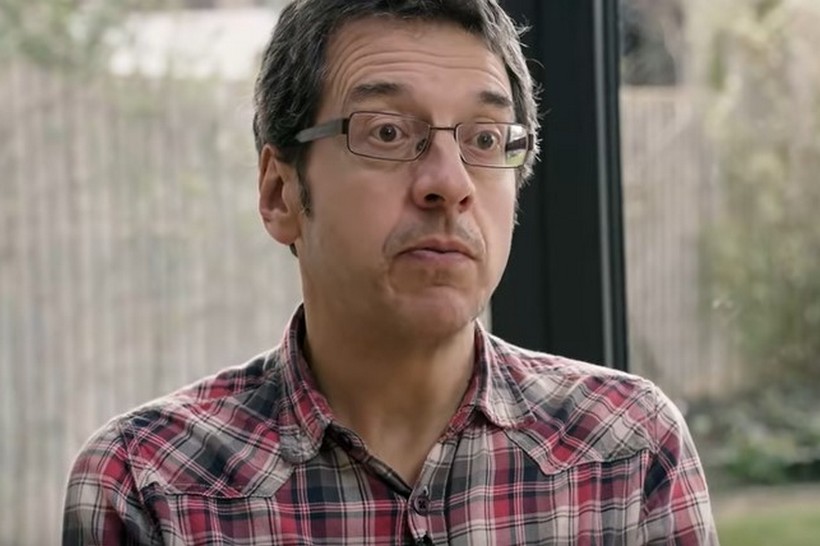“The courage of environmental activists gives me hope,” says George Monbiot, a well-known columnist for The Guardian newspaper. He speaks of the “existential crisis” facing polluting industries.
George Monbiot is the most prominent environmental columnist in the English-speaking world. His regular column in The Guardian castigates the destroyers of the planet. In Paris to launch the translation of his latest book, Nourrir le monde (Les liens qui libèrent), he gave Reporterre a frank interview.
Reporterre – Are you optimistic? George Monbiot – Yes. One of the reasons people are pessimistic is that they think you have to convince everyone for change to happen. Many historical examples show that this is not true. We have data [1] that shows how many people need to be persuaded for social change to happen: about 25% of the population. If you look at attitudes to abortion, gay marriage, women’s lib, smoking, and seat belts, you only need to reach that proportion for the tipping point to occur. Once enough people are committed, the rest of the population suddenly starts to follow.
So why do so many people in Britain, France, Poland, and Germany… oppose the Green movement and vote for very conservative parties? Unfortunately, the far right is trying to reach its tipping point, and everywhere it has proved extremely effective in seeking systemic change.
The problem is not just the far right, but the fact that there is an alliance between the super-rich and the far right… It’s true. Behind every fascist movement, there is a billionaire who discreetly supports it. The far-right scapegoats minorities: public anger is not directed where it should be, at the very rich who are destroying our means of survival.
In the future, “we could see irrepressible mass movements whose pressure forces political change”. Photo credits: Photo taken at the conference “George Monbiot – Out of the Wreckage – A New Politics for an Age of Crisis – The Gaia Foundation“.
In his recent encyclical on ecology, Pope Francis talks about the need to change the ‘irresponsible lifestyle of the Western model’. Why don’t politicians dare to say the same?
No politician outside the Green parties seems prepared to say it, even though it’s a reality we need to confront people with. It is presented as frightening because we have normalized extreme forms of consumption, even though we know they don’t make us any happier. This has to change or it will lead to the greatest unhappiness in human history. But this is considered unthinkable, not because the vast majority of the population couldn’t possibly think it, but because in Britain most of our newspapers are owned by psychopathic billionaires who don’t live in Britain. Yet they tell us how to think and how to live, and they have more influence over political parties than they do over voters. They are the ones who make it unthinkable to tell people to consume less.
How do you break the alliance between the plutocrats [2] – as you recently called them in The Guardian – and the far right?
The first step is to stop worrying about their weight. If the revolutionaries had thought: “The forces of oppression are so enormous that we can’t even think about overthrowing them”, nothing would have happened. What we know is that we can reach critical mass very quickly. What seems impossible one moment becomes inevitable the next. We must stop worrying about them and concentrate on our tactics and strategy. Of course, this is going to be extremely difficult. In the UK, incredibly oppressive laws have been passed that can put you in prison for ten years just for demonstrating.
Have they been used against environmentalists?
Yes. The Police Act 2022 and the Public Order Act 2023 are the most repressive protest laws in any so-called democracy. What’s more, in addition to criminal prosecution, public authorities and private companies can now get injunctions against anyone they don’t like and make them pay. Some of our most effective campaigners have had their lives destroyed [3].
 Just Stop Oil campaigners repainted London’s Wellington Arch at the end of October 2023 to call for an end to fossil fuels. Just Stop Oil
Just Stop Oil campaigners repainted London’s Wellington Arch at the end of October 2023 to call for an end to fossil fuels. Just Stop Oil
The powers that be are giving us everything they can, but it’s a sign of their fear. Because as the environmental crisis becomes clearer, it’s less and less possible to deny it. It is becoming an existential crisis for the fossil fuel industry, the car industry, the meat industry, the airline industry, the mining industry and many others.
How can we cope with such harsh repression?
Much worse was done to our political forebears, to the women who tried to get the vote, to the civil rights activists, to those who tried to get equal rights, to the independence campaigns. Thousands were killed or tortured. It’s still happening: hundreds of environmental activists are murdered around the world every year. What we are asking people to do – to resist this monstrous system – is very difficult, but not as difficult as what other people have faced in the past.
In fact, when people see others paying a high price for their actions, they take them more seriously. The courage of the activists gives me hope. Every time the oppressive powers think they’ve crushed us, people’s courage comes back with a vengeance.
You seem to appreciate the Extinction Rebellion (XR) strategy.
XR is very strategic. But Covid’s pandemic interrupted its very effective campaign. We were close to a turning point. Unfortunately, everyone had to go home. We have to rebuild from that position and it’s very difficult, not least because the police and politicians are more prepared this time and have introduced very repressive laws.
You debated with geographer Andreas Malm, author of Comment saboteur un pipeline. What do you think about sabotage as a tactic in the struggle?
With Andreas Malm, the question is about tactics. I’m not against people sabotaging company property or destroying infrastructure, as long as no one gets hurt. My main concern is that this exposes people to very heavy penalties. The penalties are so severe that I can’t encourage other people to do it because I’m not prepared to do it myself.

“The system is collapsing before our eyes, and there’s no mystery about the cause: neoliberal ideology.” Photo credits: Taken at the conference ‘Neoliberalism, Climate Change, Migration: George Monbiot in conversation with Verso.
You say that big organizations should be more radical. What should they be saying?
In the UK we have huge conservation organizations, the National Trust, the Royal Society for the Protection of Birds, and the Wildlife Trust, whose theory of change goes something like this: “People aren’t ready for big change. We don’t want to scare them. We’re just going to propose small changes, and one day all those small changes will make the big change we want to see”. That can’t work. We need total political, economic, social, and cultural change. These organizations should be urging their members to engage in mass civil disobedience.
“We need total political, economic, and social change.”
You started your Guardian column in 1995. What has happened to Britain since then?
A disaster. We had a reasonably well-run country in its basic functions, and all that has been destroyed. Our rivers are full of shit because the sewage system has stopped working, because there has been no investment in it for years, because the private water companies that run it have just siphoned off the money and put it in the pockets of their shareholders. Our railways are failing for the same reason. Our schools are literally collapsing because some were built with concrete that only lasts thirty years. Our hospitals are falling apart. The system is collapsing before our eyes, and there’s no mystery about the cause: neo-liberal ideology has transformed a system that worked more or less in the interests of the people into one that works in the interests of big business.
How do you see the world in 2030?
When politicians talk about 2050, they mean never. 2050 has become synonymous with never. It’s better to talk about 2030. By then we may have passed environmental tipping points and be facing a collapse of the Earth’s systems. The kind of change that is possible is unimaginable. The political changes we could see are also unimaginable. One real possibility is that the far right will take power in the UK in 2029 under the banner of the Conservative Party. But if these bad things are imaginable, so are the good things: we could see unstoppable mass movements whose pressure forces political change. Forcing the Labour Party, for example, to respond and become a party that does what it says.
Recently, former French president Nicolas Sarkozy said that the real problem is not climate change but demographics.
That’s what the right always says. It’s a way of shifting the blame from consumers in the rich world to the poorest people on the planet. We are heading for a demographic plateau in the middle of the century, and then the population is likely to start declining from around 2070, and then very sharply. This is the only environmental indicator that is not going through the roof at the moment. But there is a real demographic crisis, and that is the livestock crisis, which is growing by 2.4% a year.

“No land area can survive massive extensive livestock farming. Pexels / CC / Julissa Helmuth
What are the consequences of this livestock explosion?
By 2050, if current trends continue, we will have 100 million tons of people on the planet and 400 million tons of additional livestock. This is an absolute catastrophe because to support all that livestock we must do one of two things, both of which are devastating: the first is to cram them into huge factories and grow food elsewhere, and then dump that food into those factories, which then produce huge nutrient emissions that would kill any river. The alternative, extensive livestock farming, requires vast tracts of land. No area of land can survive massive factory farming, so the choice is between removing the rivers or removing the land. The only option is to stop eating animal products.
References
[1] In particular, the American researcher Damon Centola has developed this theory of the societal tipping point.
[2] Plutocracy is a system of government in which wealth is the basis of the political system. In such a system, the plutocrats are the richest people.
[3] Activists from Just Stop Oil, a movement supported by George Monbiot, are often severely sentenced.










